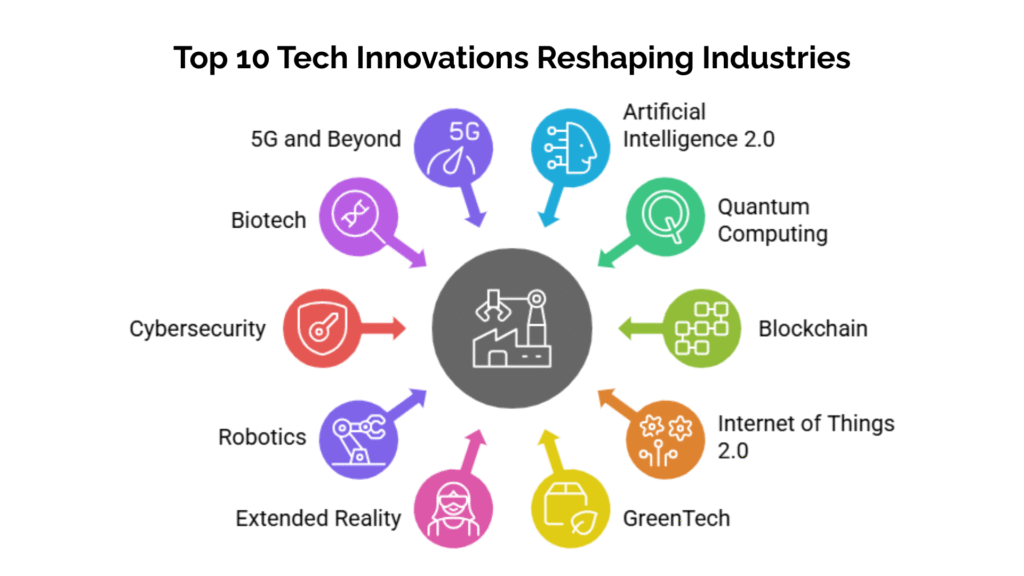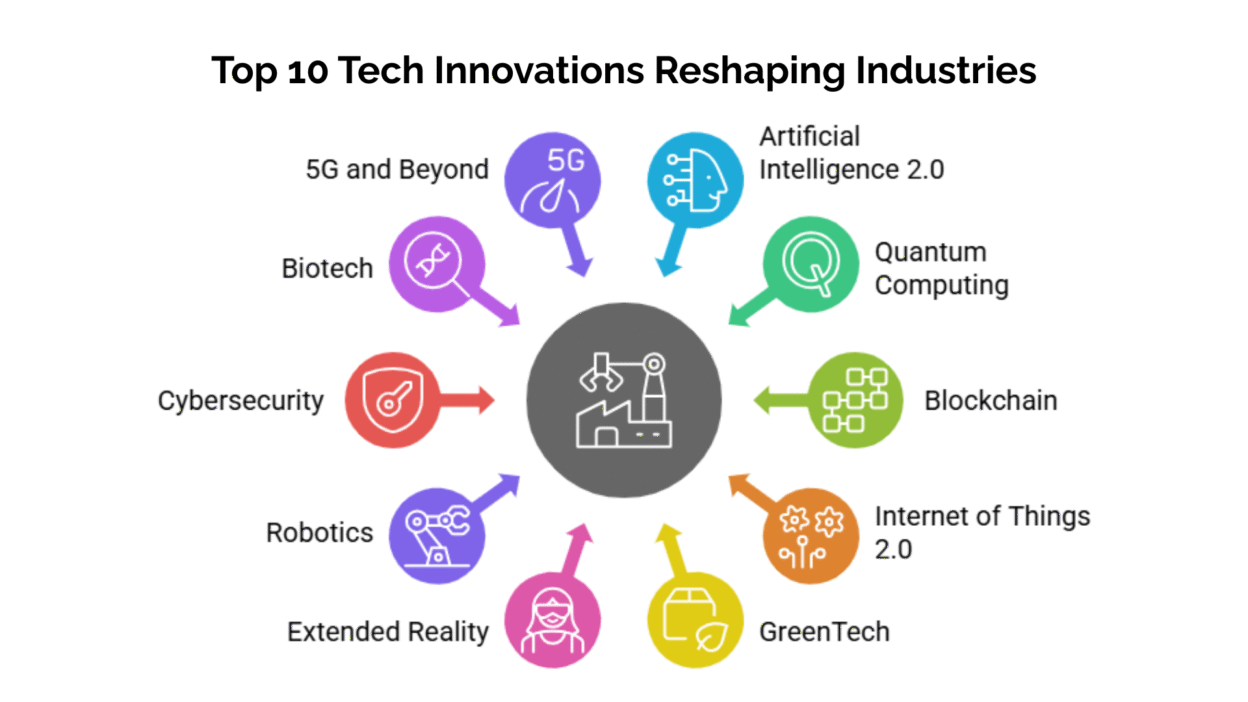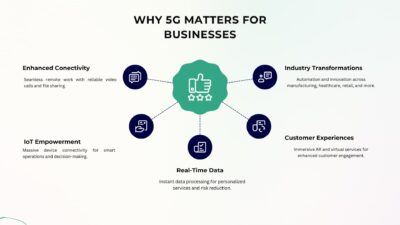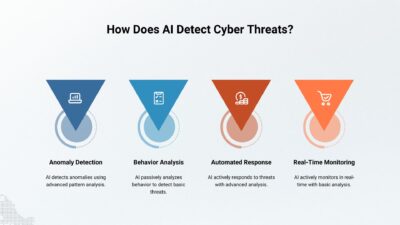Technology is evolving faster than ever. What felt futuristic just a few years ago—AI assistants, autonomous systems, or immersive digital spaces—has now become part of our daily lives and business operations. In 2025, we’re seeing a wave of innovations that are not just transforming workflows but reshaping entire industries.
From AI breakthroughs to green technologies, these innovations are redefining how businesses operate, how consumers interact, and how industries prepare for the future.
Let’s explore the Top 10 Tech Innovations leading the charge in 2025.

1. Artificial Intelligence 2.0
AI has been around for a while, but in 2025, we’ve entered the era of AI 2.0. This goes beyond basic chatbots and recommendation engines. Businesses now leverage multimodal AI systems that can process text, images, audio, and video seamlessly.
Industries impacted:
- Healthcare: AI predicts patient health issues before symptoms appear.
- Retail: Personalized shopping assistants understand preferences in real time.
- Finance: AI models analyze global market patterns within seconds.
2. Quantum Computing
Quantum computing is moving from labs to business applications. In 2025, several industries are experimenting with quantum-powered simulations to solve problems classical computers struggle with.
Industries impacted:
- Pharma: Faster drug discovery and molecular modeling.
- Logistics: Optimizing complex supply chain networks.
- Banking: Enhancing encryption and fraud detection.
3. Blockchain Beyond Cryptocurrency
By 2025, blockchain will no longer be just about Bitcoin or Ethereum. It’s become a foundation for secure, transparent, and traceable transactions across industries.
Industries impacted:
- Supply Chains: End-to-end visibility from farm to fork.
- Healthcare: Secure patient record sharing across institutions.
- Energy: Trading renewable energy credits with full transparency.
4. Internet of Things (IoT) 2.0
The first wave of IoT-connected devices. IoT 2.0 in 2025 focuses on smart ecosystems powered by edge computing and 5G. Devices don’t just collect data—they process and act on it instantly.
Industries impacted:
- Manufacturing: Predictive maintenance reduces downtime.
- Smart Cities: Traffic lights and energy grids adjust in real time.
- Agriculture: Soil sensors and drones optimize crop yields.
5. GreenTech and Clean Energy Innovations
Sustainability is no longer optional—it’s a business imperative. In 2025, GreenTech innovations are reshaping industries by cutting carbon footprints and driving efficiency.
Industries impacted:
- Construction: Smart materials and 3D-printed eco-friendly housing.
- Energy: Widespread adoption of solar, wind, and hydrogen power.
- Automotive: EV batteries with longer life cycles and faster charging.
6. Extended Reality (XR): AR, VR & Mixed Reality
Immersive technologies like Augmented Reality (AR), Virtual Reality (VR), and Mixed Reality (MR) are reshaping training, entertainment, and customer experiences.
Industries impacted:
- Education: Virtual classrooms make global learning accessible.
- Healthcare: Surgeons practice complex procedures in VR simulations.
- Retail: AR-powered shopping lets customers “try before they buy.”
7. Robotics and Autonomous Systems
From warehouses to hospitals, autonomous robots and drones are becoming standard. These machines combine AI, IoT, and automation to perform tasks faster and more safely than humans.
Industries impacted:
- Logistics: Drones deliver packages in urban areas.
- Healthcare: Robots assist in surgeries and patient care.
- Agriculture: Autonomous tractors and harvesters boost efficiency.
8. Cybersecurity with AI Defense
As digital transformation accelerates, cyber threats are growing. In 2025, cybersecurity has become AI-powered, capable of predicting and neutralizing threats before they occur.
Industries impacted:
- Finance: Real-time fraud detection safeguards billions.
- E-commerce: AI bots protect online transactions.
- Government: Advanced threat detection secures critical infrastructure.
9. Biotech and Precision Medicine
The convergence of AI, genomics, and biotechnology is revolutionizing healthcare. In 2025, precision medicine ensures treatments are tailored to individual genetic profiles.
Industries impacted:
- Healthcare: Targeted cancer therapies with fewer side effects.
- Pharma: AI-driven drug discovery shortens development timelines.
- Nutrition: Personalized diet plans based on genetic insights.
10. 5G and Beyond (6G Foundations)
Connectivity underpins all other innovations. By 2025, 5G networks are widespread, powering IoT, smart cities, and immersive applications. At the same time, research into 6G is already laying the groundwork for ultra-fast, low-latency networks.
Industries impacted:
- Telecom: Seamless global connectivity.
- Automotive: Real-time data exchange for autonomous vehicles.
- Entertainment: High-quality AR/VR streaming without lag.
The Ripple Effect: Cross-Industry Convergence
What makes 2025 especially exciting is how these innovations are interconnected. AI fuels robotics. 5G powers IoT. Blockchain secures data from wearables. Together, they’re creating intelligent, autonomous ecosystems that adapt in real time.
For example:
- A smart factory might use IoT sensors, AI for predictive maintenance, and blockchain for supply chain tracking.
- A hospital could integrate precision medicine, robotics for surgeries, and AR for medical training.
Challenges Along the Way
While these innovations are promising, industries face hurdles:
- Adoption Costs: Smaller firms may struggle with implementation.
- Skills Gap: Demand for data scientists, AI experts, and cybersecurity pros is skyrocketing.
- Ethical Concerns: Privacy, bias, and job displacement remain key debates.
Final Thoughts
2025 is a turning point. The top 10 tech innovations—from AI 2.0 and quantum computing to GreenTech and XR—are not just reshaping industries, they’re redefining the future of business and society.
For business leaders, the question is no longer “Should we adopt these technologies?” but “How fast can we adapt?”
Industries that embrace innovation strategically will gain competitive advantages, improve efficiency, and build resilience for the future. Those who hesitate risk being left behind in a rapidly evolving landscape.



